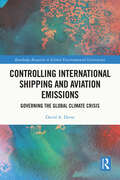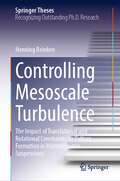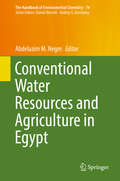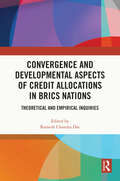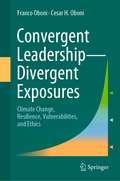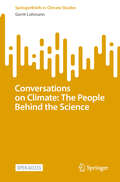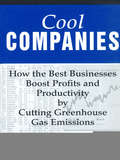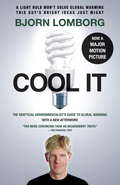- Table View
- List View
Controlling Climate Change
by Bert Metz"An unbiased and comprehensive overview, based on the findings of the IPCC (Intergovernmental Panel on Climate Change). Using no jargon, it looks at tackling and adapting to man-made climate change, and works through the often confusing potential solutions. Bert Metz is the former co-chair of the IPCC, at the center of international climate change negotiations. His insider expertise provides a cutting edge assessment of issues at the top of the political agenda. He leads the reader succinctly through ambitious mitigation scenarios, in combination with adapting our future societies to different climate conditions and the potential costs of these measures. Illustrations and extensive boxed examples motivate students to engage with this essential global debate, and questions for each chapter are available online for course instructors. Minimal technical language also makes this book valuable to anyone with an interest in action to combat climate change"--Provided by publisher.
Controlling Differential Settlement of Highway Soft Soil Subgrade: A New Method And Its Engineering Applications (SpringerBriefs in Applied Sciences and Technology)
by Hanhua Zhu Mengchong Chen Zhijun Wu Yongli ZhaoDrawing on years of practical on-site experience, this book presents a new method for controlling "bridge-head bumping" in soft soil ground. Based on deformation compatibility and control theory of structure, it proposes strategies for improving the design method of soft soil ground and the effective "bridge-head bumping" control method. Soft soil ground is chiefly characterized by a large void ratio, high compressibility, high water content, low impermeability, low strength, strong structure and high sensitivity. As a result, it has pronounced rheological properties, and controlling "bridge-head bumping" in soft soil ground is essential to control the amount of soil rheology-induced unstable successive settlement. The book offers extensive information on this and related topics, making it a valuable guide for engineers in Civil Engineering and Geotechnical Engineering alike.
Controlling International Shipping and Aviation Emissions: Governing the Global Climate Crisis (Routledge Research in Global Environmental Governance)
by David A. DeeseThis book assesses the extent to which two specialized UN agencies- the International Maritime Organization (IMO) in London and the International Civil Aviation Organization (ICAO) in Montreal - have been able to regulate environmental pollution in the global commons. Since the Kyoto Protocol and its tasking of these two International Organisations (IOs) in 1997 to regulate greenhouse gas emissions from the fast-growing international shipping and aviation sectors, they have struggled with the assignment even as the external pressure has mounted for them to act. David Deese examines why these two UN agencies have largely failed to execute their critical missions to date and explores the most promising emerging and feasible routes to control and reduce these emissions by other means. Drawing on a range of sources including interviews with key actors in the IMO and ICAO, as well as from industry and national governments, Deese looks at the multifaceted politics that drive these IOs and considers how this has delayed and frustrated the execution of their assigned climate mitigation missions. He also explains how the limitations of the IMO and ICAO are likely to be found to a degree in other UN specialized agencies and examines how lessons learned here will be helpful in understanding the operations of other IOs. The book will be of great interest to students and scholars of global governance and international organisations, transport and environment and climate change. It will also be a useful resource for industry and non-profit experts and public officials working in shipping and aviation regulation.
Controlling Mesoscale Turbulence: The Impact of Translational and Rotational Constraints on Pattern Formation in Microswimmer Suspensions (Springer Theses)
by Henning ReinkenThis thesis combines methods from statistical physics and nonlinear dynamics to advance research on the pattern formation in active fluids in several directions. In particular, it focuses on mesoscale turbulence, a state observed in microswimmer suspensions, which is characterized by the emergence of dynamic vortex patterns. The first major contribution concerns the bottom-up derivation of a frequently used continuum model of mesoscale turbulence from a set of particle-resolved stochastic equations. Utilizing the model, mesoscale turbulence is shown to induce nontrivial transport properties including a regime of optimal diffusion. The thesis then explores possible strategies of control. One of these relies on an external field that leads to stripe-like structures and can even suppress patterns entirely. The other involves geometric confinement realized by strategically placed obstacles that can reorganize the flow into a variety of ordered vortex structures. The turbulence transition inside an obstacle lattice is shown to have an intriguing analogy to an equilibrium transition in the Ising universality class. As a whole, this thesis provides important contributions to the understanding and control of turbulence in active fluids, as well as outlining exciting future directions, including applications. It includes a substantial introduction to the topic, which is suitable for newcomers to the field.
Controlling Pollution
by John Norregaard Valrie Reppelin-HillA report from the International Monetary Fund.
Controlling the Effective Hamiltonian of a Driven Quantum Superconducting Circuit (Springer Theses)
by Jayameenakshi VenkatramanThe thesis illustrates, with a remarkable combination of theoretical analysis and experimental investigation, how the static Hamiltonian of an oscillator with both 3rd and 4th order non-linearity can morph into a profoundly different Hamiltonian under the influence of an oscillating driving force. In a classical system, such transformation would not be considered a novelty, but the author demonstrates that the new Hamiltonian can possess an exotic symmetry with surprising new quantum properties that one would never anticipate from the original Hamiltonian, with no classical equivalent. The root cause of these unexpected properties is a subtle interference effect, which is only possible in a quantum context. Carefully crafted control experiments ensure that measured data are compared with theoretical predictions with no adjustable parameters. Instrumental in this comparison is a new diagrammatic theory developed by the author.
Convection in Ferro-Nanofluids: Physical Mechanisms, Flow Patterns, and Heat Transfer (Advances in Mechanics and Mathematics #40)
by Aleksandra A. Bozhko Sergey A. SuslovThis book covers the experimental and theoretical study of convection in non-isothermal ferro-nanofluids (FNFs). Since FNFs are not transparent and magnetic fields are very sensitive to the shape of the boundary between magnetic and nonmagnetic media, special flow visualization techniques based on the use of thermo-sensitive liquid crystal films, infrared cameras, as well as local and integral temperature sensors are discussed in the book. This book considers several major configurations of convective chambers and the applied magnetic field. For each of them, the stability boundaries are determined theoretically and experimentally. The physical types of dominant instabilities and the characteristics of their interactions are subsequently established using linear and weakly non-linear hydrodynamic stability analyses and elements of bifurcation theory. The book also discusses the potential of using magnetically controlled ferro-nanofluids as a heat carrier in situations where heat removal by natural convection is not possible due to the lack of gravity (orbital stations) or extreme confinement (microelectronics). Researchers and practitioners working in the areas of fluid mechanics, hydrodynamic stability, and heat and mass transfer will benefit from this book.
Convection in Porous Media
by Adrian Bejan Donald A. NieldConvection in Porous Media, 4th Edition, provides a user-friendly introduction to the subject, covering a wide range of topics, such as fibrous insulation, geological strata, and catalytic reactors. The presentation is self-contained, requiring only routine mathematics and the basic elements of fluid mechanics and heat transfer. The book will be of use not only to researchers and practicing engineers as a review and reference, but also to graduate students and others entering the field. The new edition features approximately 1,750 new references and covers current research in nanofluids, cellular porous materials, strong heterogeneity, pulsating flow, and more.
Convection in Porous Media
by Adrian Bejan Donald A. NieldThis updated edition of a widely admired text provides a user-friendly introduction to the field that requires only routine mathematics. The book starts with the elements of fluid mechanics and heat transfer, and covers a wide range of applications from fibrous insulation and catalytic reactors to geological strata, nuclear waste disposal, geothermal reservoirs, and the storage of heat-generating materials. As the standard reference in the field, this book will be essential to researchers and practicing engineers, while remaining an accessible introduction for graduate students and others entering the field. The new edition features 2700 new references covering a number of rapidly expanding fields, including the heat transfer properties of nanofluids and applications involving local thermal non-equilibrium and microfluidic effects.
Conventional Water Resources and Agriculture in Egypt (The Handbook of Environmental Chemistry #74)
by Abdelazim M. NegmThis unique volume focuses on Egypt’s conventional water resources and the main water consumer: Egypt’s agriculture. It provides an up-to-date overview and the latest research findings, and covers the following main topics: · History of irrigation and irrigation projects · Key features of agriculture, the administrative and legal framework in Egypt · Land resources for agriculture development · Food insecurity due to water shortages and climate change; resulting challenges and opportunities · Assessment of water resources for irrigation and drinking purposes · Impacts of upstream dams, such as the GERD and Tekeze Dam, on Egypt’s water resources and crop yield · Sustainable use of water resources and the future of mega irrigation projects · Quantity and quality of water in Egypt’s water resources bank This book and the companion volume Unconventional Water Resources and Agriculture in Egypt offer invaluable reference guides for postgraduates, researchers, professionals, environmental managers and policymakers interested in water resources and their management worldwide.
Convergence Clubs and Spatial Externalities: Models and Applications of Regional Convergence in Europe (Advances in Spatial Science)
by Stilianos AlexiadisDo dynamic externalities, in the form of technology creation, adoption and spatial agglomeration shape the pattern of regional growth in Europe? This study provides an alternative view on regional convergence. A model is developed which attributes club-convergence to existing differences with respect to the degree of technology adoption. In the first instance, empirical results suggest that the NUTS-2 regions of the EU-27 converge at a very slow rate. Further tests, however, indicate that convergence is restricted to a specific subset of regions. Such conclusions are tested further, using an alternative model of club-convergence, which incorporates the impact of spatial interaction, agglomeration externalities and technology. This shows that the convergence-club in Europe follows a certain geographical pattern and all members share similar characteristics regarding technology creation and adoption, and agglomeration externalities.
Convergence and Developmental Aspects of Credit Allocations in BRICS Nations: Theoretical and Empirical Inquiries
by Ramesh Chandra DasThis book explores the levels of cooperation and the phenomenon of convergence among BRICS nations. It provides an in-depth look into the financial and banking systems among these rapidly developing economies and the steps they have taken to foster development and counter inequalities.Of the many factors in determining the income and wealth of a country as well as a group of countries, commercial bank credit, a well-known financial indicator, has been an important one. This book analyses the governance and structure of the New Development Bank and its effects on group members for peer growth and to defend against any external economic and political shocks. It looks at how much of an influence the commercial bank credit, or simply the credit, has upon the income levels of the BRICS member countries, how equitable they are, whether they are converging in credits and incomes, and other such issues. It also focuses on India’s credit aspects of inclusiveness and convergence.With a strong empirical model estimation, this book will be of interest to students and researchers of economics, finance, management, political studies, international relations, and international trade.
Convergence-Confinement Method for Tunnel Design (Springer Tracts in Civil Engineering)
by Jean Sulem Marc PanetThis book presents the theoretical bases and the application tools for using the 'convergence-confinement' method which is a rational method largely used in design engineering for tunneling. Until recently, the stability conditions of underground works and the choice of support methods were essentially defined on the basis of good practice or empirical methods. The progress made, on one hand on the knowledge of the constitutive laws of soils and rocks and, on the other hand on the numerical modeling of the interaction between the ground and the structures have led to the development of robust design tools for tunnels supports. The convergence-confinement method makes it possible to simulate the excavation of a tunnel and the installation of the support using a simple plane strain model. The book presents the theoretical bases of the method and its most recent developments. Closed-form solutions for stress and displacement fields around tunnels are provided for elastic, viscoelastic and elasto-plastic behavior of the ground. More generally, the principles for applying the method in numerical models are presented.
Convergence: An Architectural Agenda For Energy
by Kiel MoeConvergence is based on the thermodynamic premise that architecture should maximize its ecological and architectural power. No matter how paradoxical it might initially seem, architects should maximize energy intake, maximize energy use, and maximize energy feedback and reinforcement. This presumes that the necessary excess of architecture is in fact an architect’s greatest asset when it comes to an agenda for energy, not a liability. But how do we start to understand the full range of eco-thermodynamic principles which need to be engaged with in order to achieve this? Kiel Moe explicates three factors: materials, energy systems and amortization. When these three factors converge through design, the resulting buildings begin to perform in complex, if not subtle, ways. By drawing on a range of architectural, thermodynamic, and ecological sources as well as illustrated and well-designed case studies, the author shows what architecture stands to gain by simultaneously maximizing the architectural and ecological power of buildings. .
Convergent Leadership-Divergent Exposures: Climate Change, Resilience, Vulnerabilities, and Ethics
by Franco Oboni Cesar H. OboniThis book aims, through its chapters, at providing the knowledge to make competent decisions, convince peers or top management to take appropriate action, or beat out the competition for climate adaptation measures including adjustments for design and operations. Topics discussed include business-as-usual vs. divergence; the effects of public pressure on corporate, industrial and government decision making; techniques for gathering the proper information to assess risks and hazards; the importance determining risk tolerance thresholds; the difference between tolerable risks, intolerable ones that benefit from mitigation and those that require strategic shifts; why common practice approaches such as FMEA, and risk matrices are inadequate in today’s world and do not help ensure infrastructural and systemic resilience and sustainability.Case histories and three complete case studies that can be adapted to any industry or project walk the reader step by step from client request to recommendations and conditions of validity. The ultimate aim is to understand how to reduce risks to tolerable and societally acceptable levels while simultaneously creating sustainable and ethical systems.
Conversation Analysis
by Ian Hutchby Robin WooffittTalk is a central activity in social life. But how is ordinary talk organized? How do people coordinate their talk in interaction? And what is the role of talk in wider social processes? Conversation Analysis has developed over the past forty years as a key method for studying social interaction and language use. Its unique perspective and systematic methods make it attractive to an interdisciplinary audience. In this second edition of their highly acclaimed introduction, Ian Hutchby and Robin Wooffitt offer a wide-ranging and accessible overview of key issues in the field. The second edition has been substantially revised to incorporate recent developments, including an entirely new final chapter exploring the contribution of Conversation Analysis to key issues in social science. The book provides a grounding in the theory and methods of Conversation Analysis, and demonstrates its procedures by analyzing a variety of concrete examples. Written in a lively and engaging style, Conversation Analysis has become indispensable reading for students and researchers in sociology, sociolinguistics, applied linguistics, social psychology, communication studies and anthropology.
Conversations About Visiting and Managing the National Parks: Crowdsourcing America’s Best Idea
by Robert Manning Dr Elizabeth E. PerryAs the popularity of the national parks grows, so do the challenges of visiting and managing them. This innovative book uses crowdsourcing - postings by park visitors on a range of social media sites - to start 100 conversations on issues associated with visiting and managing the national parks. The authors then use their experience and expertise to prepare short, plainspoken, and engaging essays that respond to the postings and complete the conversations. The book is written for park visitors, managers, and students. The authors are university professors who teach the history, philosophy, and management of national parks, conduct long-term programs of research for the National Park Service, and have spent years working and living in the national parks. This inventive, thoughtful, and inviting book addresses a wide range of national park-related issues, guides readers on how to more effectively plan and conduct their national park visits, informs park planners and managers about what visitors think about the parks, introduces the latest scientific and professional information on park management, helps prepare students for careers in park management, and enhances public appreciation and protection of the national parks. Preservation of our national parks has always required an active engagement with the public. The authors take this to a new level by responding directly to the many questions and comments posed by visitors on social media with thoughtful and informative responses. Jonathan B. Jarvis, eighteenth Director of the National Park Service
Conversations on Climate: The People Behind the Science (SpringerBriefs in Climate Studies)
by Gerrit LohmannThis open access book presents interviews with high-profile climate scientists about state-of-the-art research questions. Consequences of climate change have become more and more visible and are now regularly discussed in political and societal debates. While climate scientists have been warning about potential consequences of anthropogenic greenhouse gas emissions for decades, their call for action has not sufficiently been heard for long. Meanwhile, the field of climate science has grown significantly and become more interdisciplinary. As a result, more sophisticated technologies, higher data availability as well as more advanced climate models have made the fundamental message stronger than ever: The impact of human activity on the Earth’s climate is clear and severe and irreversible consequences already occur all over the world. The authors were given the opportunity to talk to leading climate scientists from different disciplines. These do not only include theoretical physics, paleo-research, and climate modelling, but also cover the role of the biosphere, extreme weather events, and attribution science. Additionally, the interviews also address the political dimension of climate science.
Conversations with Birds
by Priyanka Kumar“An eloquent depiction of how birding engenders a deep love of our ecosystems and a more profound understanding of ourselves.” —Kirkus Reviews (starred review)Growing up at the feet of the Himalayas in northern India, acclaimed filmmaker and novelist Priyanka Kumar took for granted her immersion in a lush natural world. After moving to North America as a teenager, she found herself increasingly distanced from nature and discouraged by the civilization she saw contributing to its destruction. It was only in her twenties, living in Los Angeles and working on films, that she began to rediscover her place in the landscape—and in the cosmos—by way of watching birds.Tracing her movements across the American West, this stirring collection of essays brings the avian world richly to life. Kumar’s perspective is not that of a list keeper, counting and cataloguing species. Rather, from the mango-colored western tanager that rescues her from a bout of altitude sickness in Sequoia National Park to ancient sandhill cranes in the Bosque del Apache National Wildlife Refuge, and from the snowy plovers building shallow nests with bits of shell and grass to the white-breasted nuthatch that regularly visits the apricot tree behind her family’s casita in Santa Fe, for Kumar, birds “become a portal to a more vivid, enchanted world.”Kumar’s reflections on these messengers from our distant past and harbingers of our future offer luminous evidence of her suggestion that “seeds of transformation lie dormant in all of our hearts. Sometimes it just takes the right bird to awaken us.”
Conversations with Trees: An Intimate Ecology
by Stephanie KazaFrom a pioneering thinker in the field of religion and ecology, a collection of evocative meditations on the beauty, fragility, and resilience of trees. Included are twenty-seven original lithographs of the trees profiled in each chapter.First published in 1993, Stephanie Kaza's heartfelt book helped thousands of readers kindle a sense of spiritual connection through communing with our ancient relatives - trees. Shambhala Publications is proud to reissue this book, with a beautiful new cover and a new Introduction by the author. More pertinent now than ever, Kaza's intimate exploration of the lives and relationships of individual trees exemplifies the conjunction of inquiry and emotion, of science and spirituality. In an era of species extinction and worsening climate change, this book is a warm and earnest invitation to personal and ecological sanity.
Conversion of Large Scale Wastes into Value-added Products
by Malini Balakrishnan Justin S. J. Hargreaves Vidya S. Batra Ian D. PulfordThis book describes how large-scale wastes can be used as a resource for making other materials. It covers metal processing wastes (slag, red mud), fly ash from coal combustion, electronic waste, and food waste. These wastes have potential to be used in bulk (e.g., for construction applications) as well as for niche applications (e.g., in the areas of catalysis). This book reviews literature from around the world on how large-scale wastes are in use by industry as well as research on the potential applications of wastes.
Cool Cities: Urban Sovereignty and the Fix for Global Warming
by Benjamin R. BarberA pointed argument that cities—not nation-states—can and must take the lead in fighting climate change Climate change is the most urgent challenge we face in an interdependent world where independent nations have grown increasingly unable to cooperate effectively on sustainability. In this book, renowned political theorist Benjamin R. Barber describes how cities, by assuming important aspects of sovereignty, can take the lead from faltering nation states in fighting climate change. Barber argues that with more than half the world's population now in urban areas, where 80 percent of both GDP and greenhouse gas emissions are generated, cities are the key to the future of democracy and sustainability. In this compelling sequel to If Mayors Ruled the World, Barber assesses both broad principles of urban rights and specific strategies of sustainability such as fracking bans, walkable cities, above-ground mining of precious resources, energy and heating drawn from garbage incineration, downtown wind turbines, and skyscrapers built from wood. He shows how cities working together on climate change, despite their differences in wealth, development, and culture, can find common measures by which to evaluate the radically different policies they pursue. This is a book for a world in which bold cities are collaborating to combat climate change and inspire hope for democracy even as reactionary populists take over national governments in the United States and Europe. It calls for a new social contract among citizens and municipalities to secure not only their sustainability but their survival.
Cool Companies: How The Best Businesses Boost Profits And Productivity By Cutting Greenhouse-Gas Emissions
by Joseph J. RommDespite ongoing negotiations, consensus has not yet been reached on what action will be taken to combat global warming. A number of companies have looked beyond the current stalemate to see the prospect of reducing greenhouse-gas emissions not as a roadblock to growth and innovation but as a unique opportunity to increase profits and productivity. These "cool" companies understand the strategic importance of reducing heat-trapping emissions and have worked to cut their emissions by fifty percent or more. In the process, they have not only reduced their energy bill, but have increased their productivity, sometimes dramatically.In Cool Companies, energy expert Joseph Romm describes the experiences of these remarkable firms, as he presents more than fifty case studies in which bottom line improvements have been achieved by improving processes, increasing energy efficiency, and adopting new technologies. Romm places efforts to reduce emissions in the context of proven corporate strategies, showing managers how they can build or retrofit their operations with the latest technologies to reduce emissions and achieve quick returns on the investment. Case studies illustrate the concept of "lean production" and why systematic efforts to reduce emissions so often lead to productivity gains; explain how changes in office and building design can significantly increase productivity; present options for "cool" power -- from cogeneration to solar, wind, and geothermal energy; and explain energy efficiency in manufacturing.In profiling successful companies such as DuPont, 3M, Compaq, Xerox, Toyota, Verifone, Perkin-Elmer, and Centerplex, among many others, Cool Companies turns on its head the notion that the effort to combat global warming will come with massive costs to the industrial sector. It is a unique and essential business book for anyone concerned with increasing profits and productivity while reducing greenhouse gas emissions.
Cool It: The Skeptical Environmentalist's Guide to Global Warming
by Bjørn LomborgGlobal warming has become one of the permanent concerns of our time, with ever stronger calls to combat it via drastic programs, like the Kyoto Protocol. In this highly controversial book, Bjorn Lomborg (author of the bestselling The Skeptical Environmentalist) claims that the arguments for such action are little more than scare mongering and exposes this wide range of disinformation. Global warming is happening. It's a serious and important problem and we need to deal with it in a responsible way. B...
Cool Places: Geographies of Youth Cultures
by Gill Valentine Tracey SkeltonCool Places explores the contrasting experiences of contemporary youth. The chapters draw on techno music and ecstasy in Germany, clubbing in London, global backpacking and gangs in Santa Cruz as well as expereinces at home, on the streets and seeking employment. The contributors use these examples to explore representation and resistance and geographical concepts of scale and place in young people's lives within social, cultural and feminist studies to focus upon the complexities of youth cultures and their spatial representations and interactions. Contributors: Shane Blackman, Sophie Bowlby, Myrna Margulies Breitbart, Deborah Chambers, Luke Deforges, Claire Dwyer, Keith Hetherington, Cindi Katz, Heinz-Herman Kruger, Marion Leonard, Sally Lloyd Evans, Tim Lucas, Sara McNamee,Ben Malbon, Doreen Massey, Robina Mohammad, David Oswell, David Parker, Birgit Richard, Susan Ruddick, Tracey Skelton, Fiona Smith, Kevin Stevenson, Gill Valentine and Paul Watt


